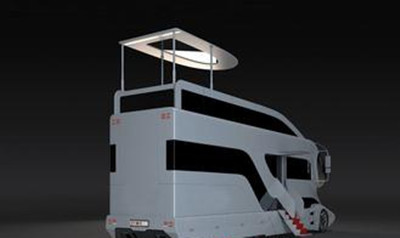伦敦车房
Garage music
车库音乐
How to make use of unloved urban spaces
怎样利用被弃置的城市空间
MERIJN ROYAARDS, a musician and architecture student, does not own a car. But for two years he has rented a small garage in east London. Tucked behind a row of shops, it has no electricity, is freezing in winter and stuffy in summer. Yet without any close neighbours it makes an ideal music studio for him and his friends.“ Drummers jump on it,” he grins.
音乐系兼建筑学学生MERIJN ROYAARDS虽然没有车,但是在过去的两年中他却在伦敦东区租了一间小型车库。车库在一排商店后面,由于没有通电的缘故,冬冷夏热。但是车库方圆几里都没有任何邻居,这使得其成为一个他和他的小伙伴们十分理想的音乐工作室。“鼓手能够直接上手,”他咧嘴一笑道。
Owning a car used to mean housing it in a garage—in 1951 one resident of Coventry told the local press that there was “no joy in having a new car if it is going to be exposed to the elements and ruffians to be ruined”. Developers obliged: over half of the homes built between 1919 and 1980 had one. But many are becoming redundant. Between 2002 and 2012 the proportion of vehicles kept in garages at night dropped from 22% to 14%.
拥有一辆车曾经意味着养在车库中落灰,1951年考文垂的一位居民这样告诉当地媒体,如果一出门爱车就将面临着被各种因素或恶棍毁坏的风险,那么拥有一辆新车只会徒添烦恼。据开发商们披露:“建造于1919年至1980年间的房屋之中,有超过一半以上的房屋配备了车库”。但有许多车库逐渐变得多余。2002年至2012年期间夜间车库的存车率从22%下降至14%。

This is partly because some households now have more cars than garage space. But it is also because big modern cars do not fit in older garages, says David Leibling, a transport expert. Few rust when left outside, and many are more difficult to steal: between 2003 and 2013 the number of vehicle thefts in England and Wales fell 76%. Instead, garages now solve a different set of problems. Householders unable to move to larger homes have taken to filling their garages with clutter. Some have become “granny annexes” for ageing parents, says Paul Bishop, who runs a garage conversion company in Bedfordshire. Others house youngsters unable, or unwilling, to leave home.
这一部分是因为现在有一些家庭拥有私家车的数量要比车位要多。不过这又可能是因为大型的现代化轿车与老旧车库的搭配并不协调,运输专家David Leibling这样说道。当车辆停放在街道外面时很少有车会生锈,并且对大部分车来说很难被偷:2003年至2013年期间,英格兰与威尔士的偷车贼下降了76%。而如今的车库反而能为我们解决一系列不一样的问题。无法搬去更大房间的房主们利用车库来堆放杂物。还有一些车库被改造成“老人厢房”,专为上了年纪的父母提供便利,在贝德福德郡经营一家车库改装公司的Paul Bishop这样说道。这样的改装车库也提供给一些无法或者是不愿意离开家的年轻人居住。
In desirable parts of London garages can sell for vast sums. But many publicly owned ones lie empty. Of the 6,000 garages owned by Hackney council, around 40% are free. Over 3,000 garages owned by ten housing associations are unused and the land they take up is unfit for building homes upon, says Steve O'Connell, a councillor at the London Assembly. He thinks they could be turned into small offices. That has already happened in places such as Berlin. Boosters hope such projects could be funded from the 9m which Boris Johnson, the mayor of London, has promised to councils who want to spruce up their boroughs.
在伦敦,车库的合意部分能卖出个好价钱。但是却有很多公家所有的车库被空置。哈克尼委员会所有的6000间车库中有大约40%的车库是免费使用的。由十家住房协会联合所有的车库中有超过3000间是从未用过的,并且车库所占据的土地也不适合在上面建造房屋,伦敦市议会的议员Steve O'Connell这样说道。他认为这些车库都能被改造成小型办公室,这样的想法也在很多地方实践过,比如柏林。支持者们希望这样的工程能够得到政府的资金资助,伦敦市市长Boris Johnson曾经向希望整顿区容区貌的委员会做出拨款900万英镑的承诺。
But converting garages can be tricky, says Bill Hodgson of University College London. Few councils are enthusiastic enough to truly champion the idea. A recent proposal to turn some garages in north London into shelters for the homeless foundered; councillors feared that local residents would not approve. Getting planning permission can be complex, and developing on local authority land is often fraught. Like the garages themselves, these plans may moulder.
但是改造车库是一件麻烦事,伦敦大学学院的Bill Hodgson这样说道。很少有足够热情的委员会会真正实施这个想法。最近一项要求将北伦敦的一些车库改造成流浪者的避难所的申请被拒绝了;议员害怕当地居民不同同意此项议案。获取计划的许可是件十分复杂的事,并且要在地方政府土地上发展项目通常是充满问题的。如同被空置的车库自身一样,这些计划也许也会流产。















